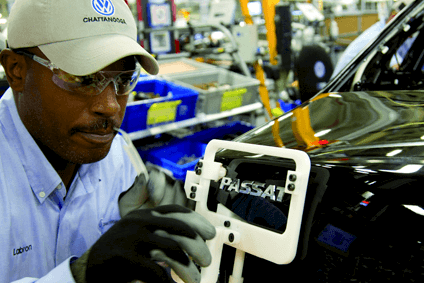In what could be a landmark vote for the Southern States of America, Volkswagen’s staff at its Chattanooga plant in Tennessee are going to the polls to determine if they wish to be represented by the UAW.
The issue has attracted widespread attention in the US where the so-called ‘right to work’ States – around 23 of them so far – exert a powerful voice arguing against compulsory payment dues to any union in the workplace.
Nobody’s advocating that for Volkswagen in Tennessee, but the issue could have particular resonance for Mississippi, where the UAW has established a separate battlefront fighting for worker representation at Nissan’s Canton plant, representation the Japanese automaker resolutely argues, its workforce doesn’t want.
Into this emotive and divisive issue – well by American standards at least – have gleefully stepped the politicians. Rarely able to keep quiet when political mischief is to be had, they have been pretty vocal, none more so it seems than Tennessee’s Senator Bob Corker (R), who has waded into the debate with a bombshell of his own.
“I’ve had conversations and based on those, am assured should the workers vote against the UAW, Volkswagen will announce in the coming weeks it will manufacture its new mid-size SUV here in Chattanooga,” he said.
The Senator also issued further comments noting: “Believe me, the decisions regarding the Volkswagen expansion are not being made by anyone in management at the Chattanooga plant and we are also very aware Frank Fischer [plant CEO] is having to use old talking points.”
I spoke to Volkswagen in Germany to gauge its reaction to that fairly incendiary outlook, but they’re somewhat between a rock and a hard place, insisting on neutrality in the unionisation debate.
However, a spokesman in Wolfsburg did cite Fischer as noting: “There is no connection between our Chattanooga employees’ decision about whether to be represented by a union and the decision about where to build a new product for the US market.”
The UAW’s view is Corker has been “swayed by special interests from outside Tennessee,” without specifying what they are and is clearly pinning its hopes on a yes vote in Chattanooga, that could have profound implications for its campaign in Mississippi.
“While outside interests and other politicians have been trying to impact the results of this vote, which would give Volkswagen workers a voice to make VW stronger in safety, job security and efficiency, improving the quality of life for everyone in Chattanooga, we believe Corker was right in his original statement that this vote should be left to the workers,” said UAW Region 8 director, Gary Casteel.
There’s also a third element swirling around the debate and that is any suggestion Volkswagen could establish some sort of Works Council along the lines of its successful model back home in Germany, although again the automaker cites its neutrality in the debate.
“Whether the plant becomes union or non-union is a matter of the employees,” a Volkswagen spokesman told me from Wolfsburg. “It is not that we [say] yes we want the union or we don’t want the union in. It is their matter.”
Despite that impartiality, Volkswagen’s foray into the union debate does obviously come with a hefty precedent globally.
The German company has more than 100 plants worldwide that are unionised – and it’s fair to say it turns in some pretty impressive results with those labour bodies on board.
In the end, this local issue will come down to a simple cross in the ballot box, but the US is different. Unions still exert a powerful political and emotive reaction in America, with politicians keen to jump on the bandwagon either way.
The vote will be as keenly watched in Mississippi as in Tennessee, in Washington as in Wolfsburg and whichever way it falls could have profound implications for the American union landscape in the future.
I see America’s National Labor Relations Board is overseeing the vote in Tennessee.
Could not this august body play more of a role in defining the parameters for union membership, or more specifically, the philosophical argument behind the right to join or not to join?
This is their charter for want of a better word and it sets out pretty clearly its own neutrality and the rights of both points of view in the US.
“The law protects the right of employees to choose or reject union representation,” it says.
“It also both protects and limits union efforts to represent an employer’s workers. For example, unions may campaign vigorously to win employees’ support, but they may not force neutral employers to cease doing business with an employer the union seeks to organise.”
So why is Senator Corker so exercised about unionisation given that black and white declaration. It’s the law after all – there is no ‘closed shop’ as used to exist in the UK.
Is there a deeper, more visceral hostility to unions in the US that has as much to do with a north/south American political divide as with hard-headed business?







